Learn
In your last lesson, you learned a bit about capitalism and how it works. Let's take a look at the some of the other economic "isms" or philosophies that developed in response to the times and compare them. Here are a few that you will be studying. In this lesson, you learn about the movements and the people who led them. Take good notes. You will see this information again when you take your unit test. Printable version
- Liberalism
- Utilitarianism and Democratic Liberals
- Socialism
- Marxist Socialism or Marxism
Liberalism
Belief in individualism and individual freedom. In economics, this liberal belief was known as the doctrine of Laissez-faire which meant the right of people to have no government intervention in business affairs. The economists who supported this doctrine are known as classical economists.
Adam Smith (1723-1790)
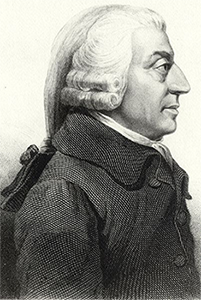
A professor from Scotland, he was the first major advocate of Laissez-faire. In his book entitled Wealth of Nations, he maintained that government’s attempts to regulate the economy as the mercantilists did in years before interfered in the operation of the natural laws that govern the economy. He said that government should not interfere in business.
Thomas Malthus (1766-1834)
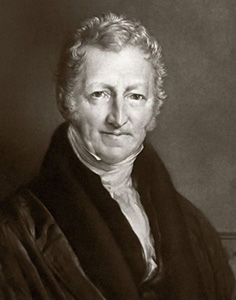
In his book entitled An Essay on the Principle of Population, he explained that the population was increasing in a geometric ratio while the food supply was only increasing in an arithmetic ratio which would result in a food supply too small to sustain a growing population causing great poverty and misery among the people. He felt that if the population growth could be slowed which happens naturally, in part, as a result of war, famine and/or disease, the conditions of society would improve. He also believed that “moral restraint” was the best way to limit population growth.
David Ricardo (1772-1823)
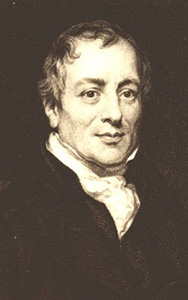
Influenced by Malthus’s work, Ricardo presented his “Iron Law of Wages” in his book The Principles of Political Economy and Taxation. He believed that wages would always stay near the subsistence minimal level as long as there were more workers than the demand for jobs—the law of supply and demand. If the supply of labor was less than the demand for it, then wages would increase. However, when wages increased, he believed that workers would be encouraged to have more children which would again bring wages down because they would be enlarging the worker supply.
He concluded that it would be useless to try to raise wages to improve the conditions of workers since they would only have more children and continue the cycle of decline.
Utilitarianism
Democratic Liberals
In England, many who had supported the classical economists’ theories had to turn away from the philosophy when they saw the reality of the conditions of the workers. They rejected the Laissez-faire policy of non-governmental intervention and petitioned the government to make reforms to help the workers.
They favored
- higher wages,
- shorter working hours,
- safer working conditions,
- establishment of labor unions and
- the provision of voting rights for all men.
Jeremy Bentham (1748-1832)
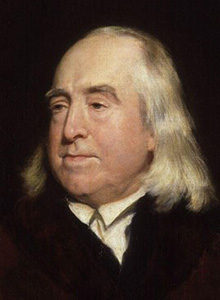
He believed that government should intervene on behalf of those who needed help. He developed the doctrine of Utilitarianism in his book Principles of Morals and Legislation. What that meant was that every human practice and institution needed to be evaluated in terms of its utility the amount of happiness it provides. He defined happiness as the presence of pleasure and the absence of pain. If more were suffering than those who were not, then the government had a right to step in providing the greatest good for the greatest number.
His ideas led to the creation of the twentieth century welfare state.
John Stuart Mill (1806-1873)
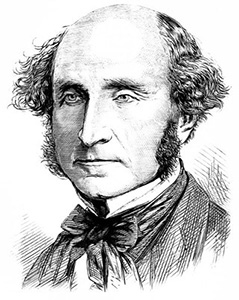
He believed in individual freedom and women’s rights, especially women’s right to vote. (Remember that women didn’t get to vote in the United States until 1919 with the 19th Amendment to the Constitution.) He wrote On Liberty, the Subjection of Women in 1869 and a book entitled Principles of Political Economy which discussed his concerns about social injustice, the unequal distribution of wealth, child labor, working conditions, and the need for state-supported education, to name a few.
Socialism
John Stuart Mill and his supporters suggested the redistribution of wealth to benefit the disadvantaged citizens through government intervention. Socialists went further in their philosophies. They called for a fundamental change in the nature of property ownership. Instead of private ownership, they advocated some sort of community or state ownership of property. That way, all people’s needs would be met. They also believed that people should be educated to work cooperatively rather than competitively so that all would work for the good of all the members of the community or state.
Robert Owen (1771-1858)

He gained part ownership of several textile mills at New Lanark in Scotland and worked to improve health and safety in the mills, increase workers’ wages, reduce work hours, and provide workers with decent housing. They made a good profit, demonstrating successful industrial capitalism did not require the workers to be exploited.
After his success, he sold his interest in New Lanark mills and went to Indiana where he established New Harmony, Indiana in 1826 , a community where people shared both ownership of property and fruits of their labor. This project failed.
Count of Saint-Simon (1760-1825)
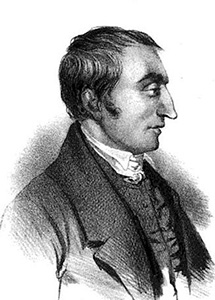
Author of The New Christianity which maintained that modern society was shaped by the nature of the industrial economy. Because of that, the focus of government needed to be economic than political issues. He said that government should be directed by scientists and technicians who understood operation of modern industrial economy. In a new society managed by business people - the managerial elite - everyone would work willingly for the benefit of society and would be rewarded based on their production and all workers’ needs would be met.
Charles Fourier (1772-1837)
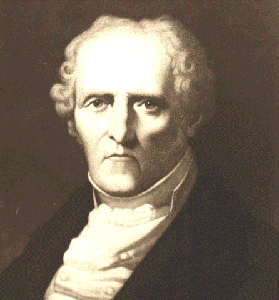
He recommended the establishment of socialist communities that he named phalanxes, each of which would be self-sufficient and consist of 1600 people who would work together on farms and in workshops. They would change jobs within their phalanxes so as to avoid becoming bored with their jobs. His ideas never caught on in France, but other countries tried to establish phalanxes. Because the idea was dependent on money donated from philanthropists people who promote the welfare of others especially through donations of money and no money ever came, it was generally unsuccessful.
Louis Blanc (1811-1882)
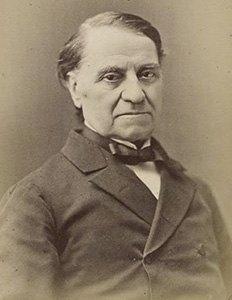
Author of The Organization of Work in 1840, he suggested that the first step toward a socialist society would involve political reform that would mean creation of a French republic that allowed all men the right to vote and a government that would lend money to voluntary workers’ cooperatives that would run the workshops. The money made would be distributed in this way: "From each according to his ability, to each according to his need. " Karl Marx later adopted this plan.
Marxism
Karl Marx was the leading socialist thinker of his time. Marx and his friend Friedrich Engels wrote a book entitled the Communist Manifesto which today forms the basis of communist thinking.
In essence, Marx saw history as a struggle between capitalists (owners of business and industry) and the proletariat (wage earners). Marx believed that capitalists had always controlled the government and used their wealth and power to their advantage causing the working class with no political pull to live miserable lives.
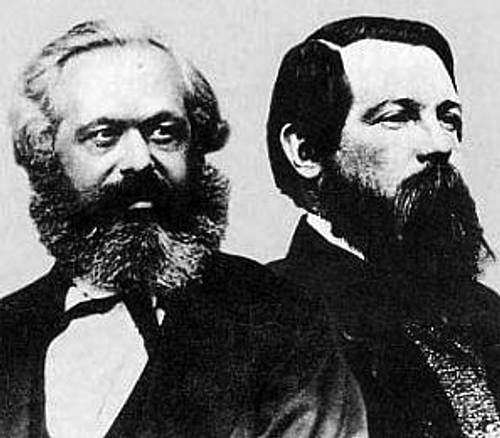
Eventually, Marx explained, the proletariat would rise up and overthrow the capitalists in a violent communist revolution and socialism would become the new form of government. After that, factories, mines, railroads, and banks would be owned by the government. Once that happened, the fruits of industrialization would be more evenly divided among all the people eliminating such issues as poverty and hunger, poor working conditions or unemployment.